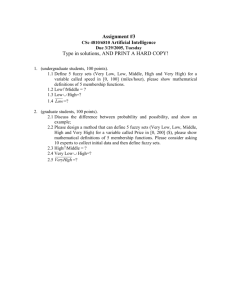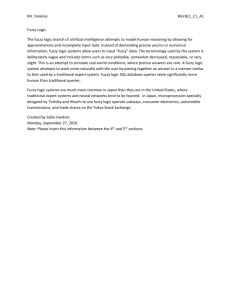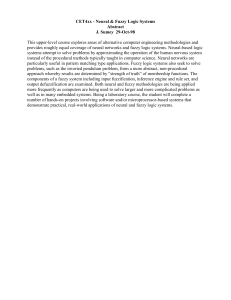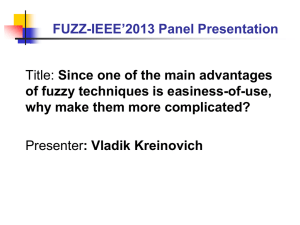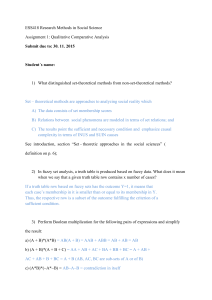ece 4831 fuzzy set theory and its applications
advertisement
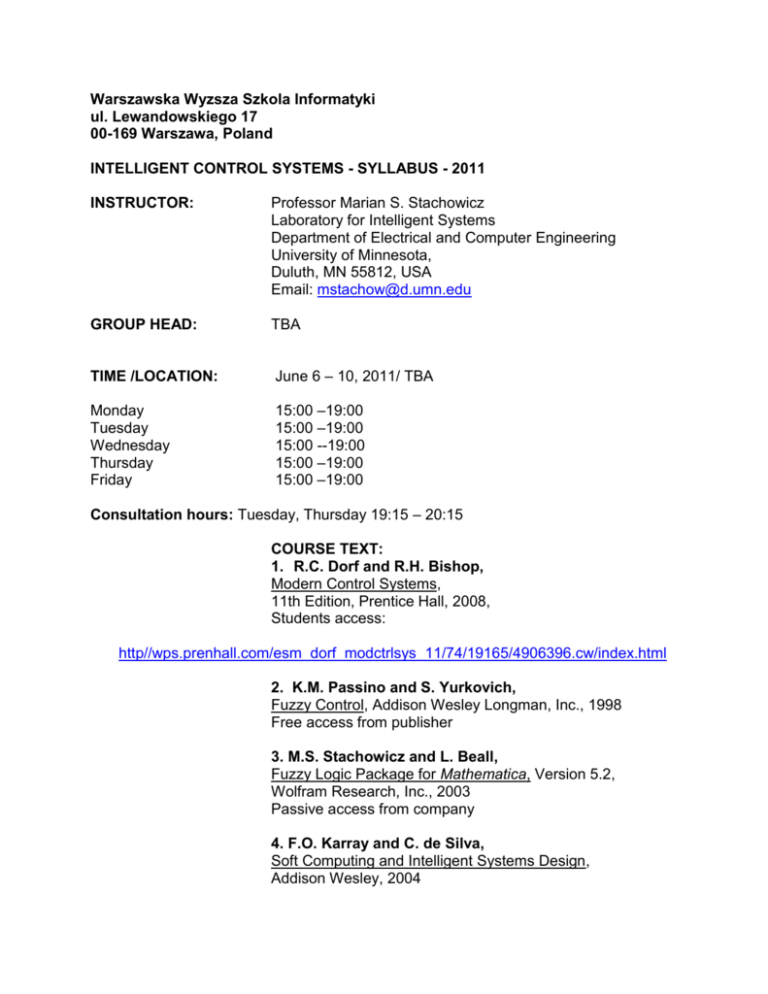
Warszawska Wyzsza Szkola Informatyki ul. Lewandowskiego 17 00-169 Warszawa, Poland INTELLIGENT CONTROL SYSTEMS - SYLLABUS - 2011 INSTRUCTOR: Professor Marian S. Stachowicz Laboratory for Intelligent Systems Department of Electrical and Computer Engineering University of Minnesota, Duluth, MN 55812, USA Email: mstachow@d.umn.edu GROUP HEAD: TBA TIME /LOCATION: June 6 – 10, 2011/ TBA Monday Tuesday Wednesday Thursday Friday 15:00 –19:00 15:00 –19:00 15:00 --19:00 15:00 –19:00 15:00 –19:00 Consultation hours: Tuesday, Thursday 19:15 – 20:15 COURSE TEXT: 1. R.C. Dorf and R.H. Bishop, Modern Control Systems, 11th Edition, Prentice Hall, 2008, Students access: http//wps.prenhall.com/esm_dorf_modctrlsys_11/74/19165/4906396.cw/index.html 2. K.M. Passino and S. Yurkovich, Fuzzy Control, Addison Wesley Longman, Inc., 1998 Free access from publisher 3. M.S. Stachowicz and L. Beall, Fuzzy Logic Package for Mathematica, Version 5.2, Wolfram Research, Inc., 2003 Passive access from company 4. F.O. Karray and C. de Silva, Soft Computing and Intelligent Systems Design, Addison Wesley, 2004 OBJECTIVES: This course is designed to give students the ability to analyze and design nonlinear feedback control systems. Intelligent control is a practical alternative for a variety of challenging control applications since it provides a convenient method for constructing nonlinear controllers via the use of heuristic information. A fuzzy sets theory, computing with words, and soft computing will be applied to create systems, which can handle imprecision, uncertainty, and partial information while preserving robustness, tractability, and low solution cost. The ideal model for such a system is the human brain. Lecture topic and schedule: Part 1 Linear and Nonlinear Control Systems [1, 4] Human-in-the-control loop [1, 2] Quiz 1 on Monday, May 6, 2011 Part 2 Quiz 2 on Tuesday, May 7, 2011 Introduction to Soft Computing The Mathematics of Fuzzy Sets [2, 3, 4] Linguistic description of human expertise [2, 3] Part 3 Quiz 3 on Wednesday, May 8, 2011 Feedback Control System Characteristics [1] The Performance of Feedback Control Systems [1, 2] Fuzzy Systems and Their Properties [2, 3, 4] Part 4 Quiz 4 on Thursday, May 9, 2011, Robustness and stability [1, 4] Design of Fuzzy Systems from Input - Output Data [3, 4] Part 5 Digital Control Systems [1, 2] Multivalued Logic [3] Fuzzy Versus Conventional Control [4] Quiz 5 on Friday, May 10, 2011, Final Project: Tools of Soft Computing in real-world applications. Teamwork. Time: Report, poster, and final presentation. TBA Grading: Q1+Q2+Q3+Q4+Q5 Final Project Grading scale: A: [90, 100] 60 % 40 % B: C: D: D-: F: [80, 90) [70, 80) [60, 70) [50, 60) 49 or less “ Individuals with any disability, either permanent or temporary, which might affect performance in this class are encouraged to inform the instructor at the start of the quarter. Adaptation of methods, materials, or testing may be made as required to provide for equitable participation.” Short CV Dr. Marian S. Stachowicz is professor and Jack Rowe Chair at the University of Minnesota and he is Visiting Professor at the AGH-University of Science and Technology, Krakow, Poland. He received his M.S. degree in Control and Computer Engineering from LETI, Soviet Union and both his Ph.D. and D.Sc. from A G-H, Poland. He previously held academic positions in Poland, as well as a number of appointments as visiting professor, including the University Linkoping in Sweden, the University of Sydney in Australia, and the University of Canterbury, New Zealand all in 2005 calendar year during his last sabbatical. Professor Stachowicz has published 7 books, 125 papers in journals, conference proceedings, and 20 patents and has been active in the research and teaching of fuzzy logic since 1982. His work centers on artificial intelligence and soft computing, decision analysis and control. Prof. Stachowicz received two prestigious awards for introduction digital fuzzy sets and he is co-author of the Fuzzy Logic Package for Mathematica. He is a senior member of IEEE and a consultant for large multinational corporations. Tips for Q1- Q5: Practice Exercises: Self-pages review exercises developed to supplement chapter content and help students develop effective problem-solving strategies from all Chapters. (See link to [1]) * Matching: Intended to help students master new terminology introduced in the book. * True/False: Intended to ask students to think conceptually about the material presented. * Multiple/Choice: Intended to provide students with extra practice on a wide array of problems.
